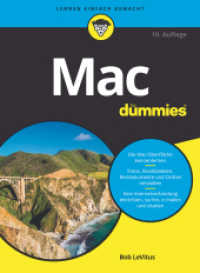Full Description
This book is open access under a CC BY licence. It spans the areas of assessment, second language acquisition (SLA) and pronunciation and examines topical issues and challenges that relate to formal and informal assessments of second language (L2) speech in classroom, research and real-world contexts. It showcases insights from assessing other skills (e.g. listening and writing) and highlights perspectives from research in speech sciences, SLA, psycholinguistics and sociolinguistics, including lingua franca communication, with concrete implications for pronunciation assessment. This collection will help to establish commonalities across research areas and facilitate greater consensus about key issues, terminology and best practice in L2 pronunciation research and assessment. Due to its interdisciplinary nature, this book will appeal to a mixed audience of researchers, graduate students, teacher-educators and exam board staff with varying levels of expertise in pronunciation and assessment and wide-ranging interests in applied linguistics.
Contents
Section 1: Introduction
1. Talia Isaacs and Pavel Trofimovich: Key Themes, Constructs, and Interdisciplinary Perspectives in Second Language Pronunciation Assessment
2. Luke Harding: What Do Raters Need In A Pronunciation Scale? The Users' View
Section 2: Insights from Assessing Other Language Skills
3. Kevin Browne and Glenn Fulcher: Pronunciation and Intelligibility in Assessing Spoken Fluency
4. Ute Knoch: What Can Pronunciation Researchers Learn From Research Into Second Language Writing?
5. Elvis Wagner and Paul Toth: The Role of Pronunciation in the Assessment of L2 Listening Ability
Section 3: Perspectives on Pronunciation Assessment from Psycholinguistics and Speech Sciences
6. Joan C. Mora and Isabelle Darcy: The Relationship between Cognitive Control and Pronunciation in a Second Language
7. Laura Ballard and Paula Winke: The Interplay of Accent Familiarity, Comprehensibility, Intelligibility, Perceived Native-Speaker Status, and Acceptability as a Teacher
8. Kazuya Saito, Pavel Trofimovich, Talia Isaacs and Stuart Webb: Re-Examining Phonological and Lexical Correlates Of Second Language Comprehensibility: The Role of Rater Experience
9. Evelina Galaczi, Brechtje Post, Aike Li, Fiona Barker and Elaine Schmidt: Assessing L2 Pronunciation: Distinguishing Features Of Rhythm in Learner Speech at Different Proficiency Levels
Section 4: Sociolinguistic, Cross-Cultural and Lingua Franca Perspectives in Pronunciation Assessment
10. Alan Davies: Commentary on the Native Speaker Status in Pronunciation Research
11. Stephanie Lindemann: Variation or 'Error'? Perception of Pronunciation Variation and Its Implications for Assessment
12. Sara Kennedy, Josée Blanchet and Danielle Guénette: Teacher-Raters' Assessments of French Lingua Franca Pronunciation
13. Andrew Sewell: Pronunciation Assessment in Asia's World City: Implications of a Lingua Franca Approach in Hong Kong
Section 5: Concluding Remarks
14. Pavel Trofimovich and Talia Isaacs: L2 Pronunciation Assessment: A Look at the Present and the Future








